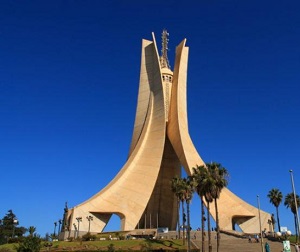 Indomitable, like the sirocco, are the people of Algeria, a land of poets and warriors. Throughout history, all cultures, mountain and interior cities came together at its ports, as if born from the warm sand of the desert. Algiers, the white city, always fraternal, “open to all winds.”
Indomitable, like the sirocco, are the people of Algeria, a land of poets and warriors. Throughout history, all cultures, mountain and interior cities came together at its ports, as if born from the warm sand of the desert. Algiers, the white city, always fraternal, “open to all winds.”
When the Cuban Revolution triumphed on January 1, 1959, the people of Algeria had not yet achieved their victory. “Something special unites us with Algeria,” stated our Comandante en Jefe Fidel Castro Ruz, “When we were fighting in the mountains, the Algerians were fighting in the wilayas.”
The People’s Democratic Republic of Algeria (PDRA) was the Guest Country of Honor to the 28th edition of the Havana International Book Fair (FIL) 2019. The Ambassador of the sister nation to Cuba, Mohamed Achache, described the Fair as “The most important cultural event in Cuba.”
A sample of the varied, ancient, and rich culture of Algeria could be appreciated within the framework of the event. In the Algerian Pavilion, visitors enjoyed an exhibition of 200 representative literary and intellectual works. Following the Fair, 80% of these books were donated to Cuba’s José Martí National Library.
Other events included concerts, screenings of Algerian films, conferences, lectures, and photo exhibitions that showed the heritage, history, architecture and landscape of the country.
Titles such as L’Algérie belle et rebelle: de Jugurtha à novembre, by Boualem Bessaïh, and The Golden Ass. The Metamorphoses of Apuleius, as well as reprints of the classic The Wretched of the Earth, by Frantz Fanon, and Manavais sang, by Rachid Mokhtari, were available to purchase during the literary event.
Among the Algerian films screened were: Zabana! (Algeria / France, 2012), directed by Saïd Ould-Khelifa; the drama Yema (Algeria / France, 2013), by Djamila Sahraoui; and Perfumes of Algiers (2012), from director Rachid Benhadj.
A total of 32 Algerian guests attended the Fair, led by Minister of Culture, Azzedine Mihoubi, author of the book Le Serment d’Atocha, which was also presented.
CUBA & ALGERIA: AN UNBREAKABLE FRIENDSHIP
Algeria is one of the richest countries in Africa. It has always stood out for its extremely fertile land in the coastal zone, and its main products are: cotton, palm fiber made from dwarf palm leaves, olives and tobacco. Approximately 25% of the population is engaged in agriculture and fishing, with a rich production of cereals, wheat, barley, wild oats, figs, dates, esparto and cork.
The major natural wealth of the country lies in its vast oil, gas, phosphate and iron reserves. In addition, it has coal, lead and zinc. Oil and gas represent 98% of its exports.
Algeria’s independence was declared in July 1962, and elections to the Constituent Assembly were held that same year.
The historic relations between Cuba and Algeria, initiated from the struggle for national liberation, are an example of fraternity and are maintained at the highest level. Fidel considered the help provided by Cuba to the Algerian people during their struggle for liberation as the first sign of our internationalist conscience.
Since its independence on July 5, 1962, Algeria has firmly supported Cuba in all international forums, challenging the pressures and threats from the United States. The close cooperation of both nations within the Non-Aligned Movement, and the support provided by Algeria in the fight against the U.S. economic, commercial and financial blockade, are worth noting.
After achieving independence, in September 1963, the Moroccan monarchy occupied border posts within Algerian territory and made territorial claims under threat of continuing the invasion if their demands were not met. Algeria requested Cuban collaboration to safeguard its territorial integrity.
The Cuban government responded positively to President Ben Bella’s request, and sent a vanguard of commanding officers and a force of 700 troops that traveled to Algeria on the ships Aracelio Iglesias and González Lines. Men and arms were gathered in Bedeau and quickly readied for combat.
The presence of the Specially Trained Group dissuaded the monarchy of Rabat, and a ceasefire agreement was reached. Later Morocco returned the occupied territory.
MEDICAL COOPERATION
The first Cuban medical brigade arrived in Algeria on May 24, 1963, composed of 32 doctors, four dentists, 14 nurses and eight technicians, 58 in all. The health personnel worked in different parts of the country, such as Blida, Sidi Bel Abbès, Constantine, Setif, Biskra and Algiers, and remained there for about 18 months.
Medical cooperation with Algeria has a special significance. The Revolution continued to send doctors and other collaborators to many countries of the world, but Algeria marked the beginning of this new concept of internationalist medical aid and, likewise, it is an example of Fidel’s political genius and profound humanist and solidary conscience.
As well as in health, Cuba and Algeria have collaborated in sectors such as energy, vaccine production, medical equipment supplies, new technologies, construction, education, culture, and sports.
Currently, more than 500 Cuban health specialists and technicians are providing their services in Algeria. The island has collaborated in the construction of hospitals and other health facilities, while Cuban experts will train executives of Algeria’s National Agency for Dams and Diversion, in the management of water resources. Algerian authorities also appreciate the experience of several Cuban sports coaches and technicians.
The Havana International Book Fair served as yet another opportunity to strengthen the close friendship between our two peoples, united by their love of independence and freedom.
(Granma)